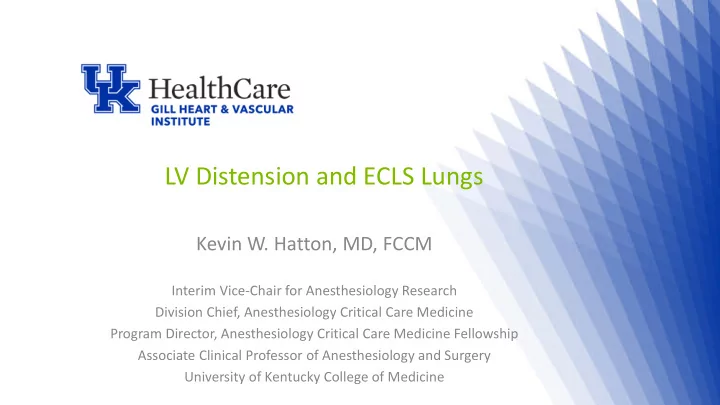

LV Distension and ECLS Lungs Kevin W. Hatton, MD, FCCM Interim Vice-Chair for Anesthesiology Research Division Chief, Anesthesiology Critical Care Medicine Program Director, Anesthesiology Critical Care Medicine Fellowship Associate Clinical Professor of Anesthesiology and Surgery University of Kentucky College of Medicine
Faculty Disclosure • Neither I nor my spouse have any conflicts to disclose.
Educational Need/Practice Gap • Gap = The decision to use VA-ECLS must be carefully weighed against possible complications. There are several possible adverse events that can occur and the practitioner should be aware of the most common. • Need = The desired change/result in practice is to be aware of the different indications and possible complications for VA ECLS.
Objectives Upon completion of this educational activity, you will be able to: 1. Indicate the mechanisms for LV distension. 2. Describe the impact of LV distension on the patient.
Expected Outcome • At the end of this presentation, learners will be able to: • Explain the mechanism for LV distension in VA ECLS • Describe the common complications of LV distension in VA ECLS • Devise a treatment plan for LV distension in VA ECLS
Introduction • 68 year old male • Admitted with SOB and fatigue • Diagnosed with acute myocarditis • Despite IABP and inotropic support, developed worsening cardiogenic shock • Placed on peripheral VA ECLS • Initial improvement but oxygenation worsens 1-2 days later Image from: Soleiani. Perfusion. 2012;27:326.
VA ECMO • ECLS Venous Drainage = RA drained via catheter placed in femoral vein • Allows significant decompression of right atrium and right ventricle • Left ventricle continues to fill with blood • Some blood passes around the RA drainage catheter to the RV • Some blood passes through collateral flow between bronchial and pulmonary arterial circulatory systems Image from: https://twitter.com/ELSOOrg/status/1008426052505522176
Retrograde Aortic Blood Flow https://twitter.com/ELSOOrg/status/1008426052505522176 https://openi.nlm.nih.gov/detailedresult.php?img=PMC3968595_CCR-10-65_F1&req=4
LV Distension • Retrograde flow results in marked increase in LV afterload • In failing LV, increased afterload may have direct effect on LV function • Increased LV wall stress and myocardial O2 consumption • LV and LA blood stasis and intra-cardiac thrombosis • In addition, incompetent mitral valve may improve LV distension but may lead to pulmonary edema • Increased LV dilatation • Increased LA pressure • Pulmonary edema
Risk Factors for LV Distension • High pulmonary venous return to LV due to inadequate drainage from RA into the ECMO circuit • Incorrect ECMO settings • Inappropriately placed RA cannula • Intrinsically high collateral blood flow between bronchial and pulmonary circulations • Failure of aortic valve to open • Absence of functional MR allowing retrograde LV off-loading • Aortic valve incompetency
Definition of LV Distension 121 patients requiring VA ECMO at single academic medical center LV Distension (LVD) defined by: • Radiographic pulmonary edema • PADBP > 25 mmHg 36 patients developed LVD (29.8%) • 9 treated with early LV decompression Image from: Truby. ASAIO J. 2017;63:257.
Diagnostic Options • Clinical diagnosis • Chest radiography • ECHO (TTE or TEE) • Swan-Ganz Catheter • Serial BNP measures Image from: http://clipart-library.com/clipart/399334.htm
TEE Images of LV Distension Images from: Soleiani. Perfusion. 2012;27:326.
Treatment of LV Distension The most important treatment to prevent complications of LV distension is to rapidly decompress LV. Image from: http://clipart-library.com/clipart/2703.htm
Conservative Treatment of LV Distension • Conservative therapies • Exclude mechanical problems with ECMO • TTE to evaluate cannula positions • Aggressive diuretic therapy to reduce systemic overload • Inotropic therapy to improve myocardial function
Mechanical Treatment of LV Distension • IABP counter-pulsation • Atrial septal defect • Percutaneous atrial septostomy • Surgical septostomy • LV venting procedures • Open surgical procedure • Minimally-invasive procedures • Percutaneous procedures Image from: http://clipart-library.com/clipart/8izrdaL4T.htm
Published Venting Studies Image from: Meani. Eur J Heart Failure Suppl. 2017;19:84.
ECLS and IABP Image from: Cheng. J Invasive Cardiol. 2015;27:453.
LV Venting Procedures • Surgical LV Vent Procedure • Most commonly used in patients with central cannulation • Catheter placed through right superior pulmonary vein into LA or LV • Connected with Y-connector to drainage side of ECLS circuit • Transfemoral LV cannula drainage • Impella 2.5 (Abiomed, Danvers, MA) • TandemHeart (CardiacAssist, Pittsburgh, PA)
Transfemoral Percutaneous LV Cannula Images from: Hong. ASAIO J. 2016;62:117.
Edema Improved by Transfemoral Cannula Images from: Hong. ASAIO J. 2016;62:117.
LV Distension Improved by Impella Device • Case series of 5 patients requiring peripheral VA ECLS • Impella 2.5 placed within 6 hours of VA ECLS in contralateral femoral artery • PCWP > 18 mmHg • Absent aortic valve opening • Enlarged LV on TEE • Impella titrated to PCWP < 12 mmHg Image from: Cheng. ASAIO J. 2013;59:533.
Future Directions 1. Optimize definition of LV distension in ECLS patients 2. Define population of ECLS patients who will benefit from LV decompression procedure 3. Define optimum LV decompression procedure
Conclusions • LV distension is common in patients requiring peripheral VA ECLS for cardiogenic shock • LV distension occurs because retrograde aortic blood flow significantly increases LV afterload • LV distension may cause: • Increased LV wall stress, chamber diameter and myocardial O2 consumption • LV and LA blood stasis and intra-cardiac thrombosis • LA enlargement, pulmonary venous congestion and pulmonary edema
Conclusions • LV distension is primarily diagnosed with TEE but can also be seen through elevations in CVP, PAWP, and PADBP • The treatment of LV distension is LV decompression: • Conservative treatments • IABP counter-pulsations • Surgical LV decompression • Percutaneous LV decompression
Recommend
More recommend